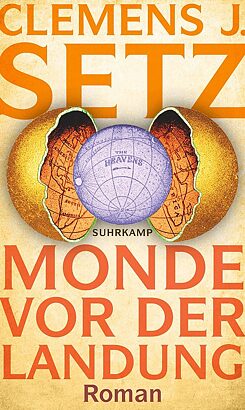Austrain Book Prize 2023
A Tragic Contrarian
In Clemens J. Setz’s new novel, the main character believes that people do not live on, but inside the earth.
By Holger Moos
Twelve years ago, Clemens J. Setz won the Leipzig Book Fair Prize with his short story collection Die Liebe zur Zeit des Mahlstädter Kindes. This year, the Austrian author was again nominated for the shortlist with his historical novel Monde vor der Landung, “A big hit,” according to the jury’s statement.
The novel’s protagonist is Peter Bender, a former lieutenant pilot in the German Army, who founds a kind of sect in Worms in the early 1920s. He is an adherent of the hollow earth theory according to which humans do not live on, but inside a sphere. The book often takes readers inside the mind of this outsider, whom a befriended soldier calls an “crank.” The association with today’s contrarians, who also like to propagate “alternative” truths and theories, is obvious.
Setz penetrates deeply into the twisted thoughts and feelings of his main character, who has a very wilful intelligence. It is a story whose tragedy unfolds both in his inner life and in outer events. Bender ends up in prison and in a psychiatric ward because of his world view. The leaders of the Nazi regime ensure that both he and his Jewish wife end up in a concentration camp.
Mostly from the war
First, Bender returns severely traumatised from the First World War. He not only saw his comrades mutilated, but he also narrowly survived a plane crash and suffered a severe head injury. In the military hospital he meets his future wife Charlotte, who is working there as a nurse. His belief in the hollow earth theory cannot be shaken by anything, not even by his own perception. Although as a pilot he could clearly see the curvature of the earth, he dismisses it as an optical illusion, saying, “That’s what they called it. And it looked, you had to admit, completely convincing.”In civil life, Bender is a failure in more ways than one. He barely generates an income with his lectures and writings. Charlotte supports them both as a private language teacher. To justify his affair with a follower, he integrates the idea of free love into his world view; not too free, however. Even if he claims that his wife Charlotte has no problem with this affair, she is not allowed to know.
Bender’s behaviour is erratic, sometimes he is silent, then he pours out a veritable torrent of words on his fellow men. Time and again he has emotional outbursts and laughs spontaneously in inappropriate situations. He also suffers from epileptic seizures. His occasional violent fantasies may be the result of his war experiences. When he comes home from a reading circle consisting of “mostly men from the war” who – to prevent future wars – want to usher in the “great age of mothers,” he makes contradictory statements, saying he had enjoyed the reading circle very much, but he did not want to go back. At the sight of his wife, he suddenly wants to “knock out one of the Matridians ... open their chest cavity, scrape it out, fill it with slugs, sew it up, done.”
From megalomania to breakdown
In Bender, Setz demonstrates human obsessions and irrationalities that are nevertheless dressed up in rational terms. It is only a small step from pathetic megalomania to a psychological breakdown – and vice versa – in the “Age of Extremes.”Monde vor der Landung confirms Setz’s exceptional position in contemporary German-language literature. In brilliant prose, he tells the story of Bender’s tragically grotesque failures based on numerous historical documents, which Setz embellishes and develops further in his fictional narrative. Ultimately, he is a single conspiracy theorist foundering in the face of an incomparably larger conspiracy theory movement: National Socialism. The majority of Germans were only too willing to believe its fairy tale of a global Jewish conspiracy.
There is nothing reassuring about Setz’s novel. For even if one imagines that Bender’s fantasies of power could have come true and he would have become the chairman of a powerful organisation, it is hardly conceivable that the outcome would have been a good one for humanity. We humans seem to be too at the mercy of the delusions of the realities we more or less cobble together.
Clemens J. Setz: Monde vor der Landung. Roman
Berlin: Suhrkamp, 2023. 528 S.
ISBN: 978-3-518-43109-2
You can find this title in our eLibrary Onleihe.

